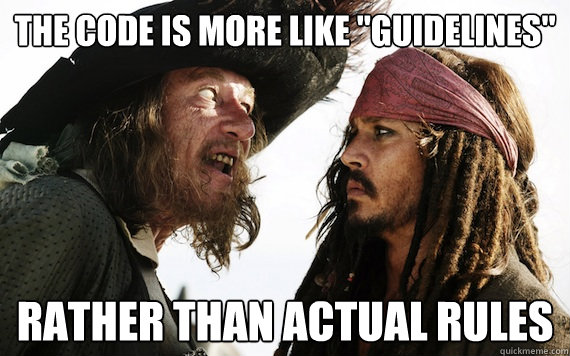
I know it sounds a bit cheesy, but the rules of evidence are a lot like the Pirate Code.
Throughout our imprisonment in the American education system, we (students) have slowly been taught the “rules” of evidence.
We are all aware that in an essay we cannot write an argumentative essay without evidence to support us. We are also aware that we are forbidden from using “unreliable” sources to explain our point of view – i.e. a Buzzfeed article or Wikipedia. If we fail to present resources that meet these requirements, we could end up discrediting our overall perspective in our said essay.
Don’t get me wrong. These rules are great for formal arguments. They allow students to learn about research and let them make judgements about the accuracy of a resources’ information.
However, the real-world isn’t nearly as organized.
The problem is that schools make students focus too much on research. Although research is crucial in defining and supporting one’s position in a debate, it is not always realistic. This is the main idea that the author (Kathryn Schulz) of Evidence is attempting to address. She states, “…What are we supposed to do in situations where additional evidence is not necessarily forthcoming?” (Schulz 3)
For example: If a salesman is asked (on the spot) to explain to their customer why the product they are selling is so wonderful, he cannot contemplate the question for a long-period of time (as one might do while writing an essay). The salesman can’t spend hours researching all of the pros and cons of their product. Their audience (the customer) doesn’t want to hear a formal argument supported by quotes. They want to hear someone else describe their perspective in a few short sentences. (As you can tell, this is the complete opposite approach to an academic essay).
Schulz wants her audience (us) to understand that it’s alright not to have substantial evidence. She encourages her readers to instead address inductive and deductive reasoning methods.
What’s that?
Inductive Reasoning: When one forms a conclusion based off of facts that they already know to be true or false.
Deductive Reasoning: When one forms a conclusion based off of assumptions (whether they be true or false) about the current situation.
By using common knowledge, we can often consider what our perspective on a subject might be. Granted, these methods are not always 100% accurate. But they’re not meant to be. They’re meant to be used as a tool to help us develop our opinions if ever put on the spot (like the salesman above).
The same goes for how we interpret evidence presented by other people (without clear sources). Inductive and deductive reasoning can also be used to determine whether or not the argument being presented to us is mostly true or mostly false.
Overall, Schulz is just trying to address the fact that the “rules” of evidence are not set in stone.
No matter how hard one tries to form a conclusion on a subject, we’re only human. And there will be many times where we argue or believe inaccurate evidence.
“You can’t very well caution people against believing things that aren’t true, since, as we’ve seen, all of us necessarily think our beliefs are true.” (Schulz 2)
Leave a comment